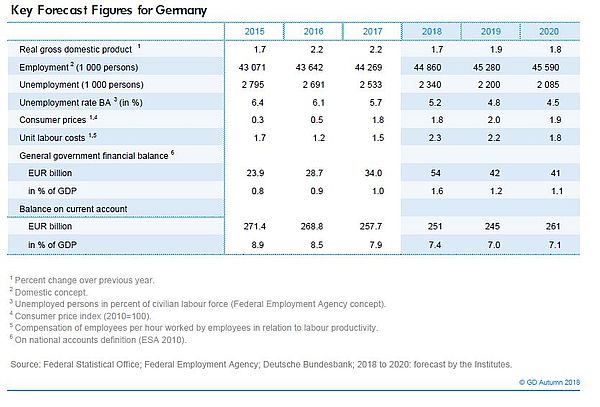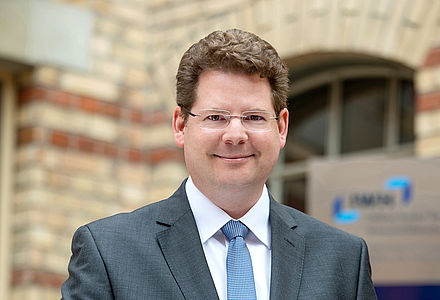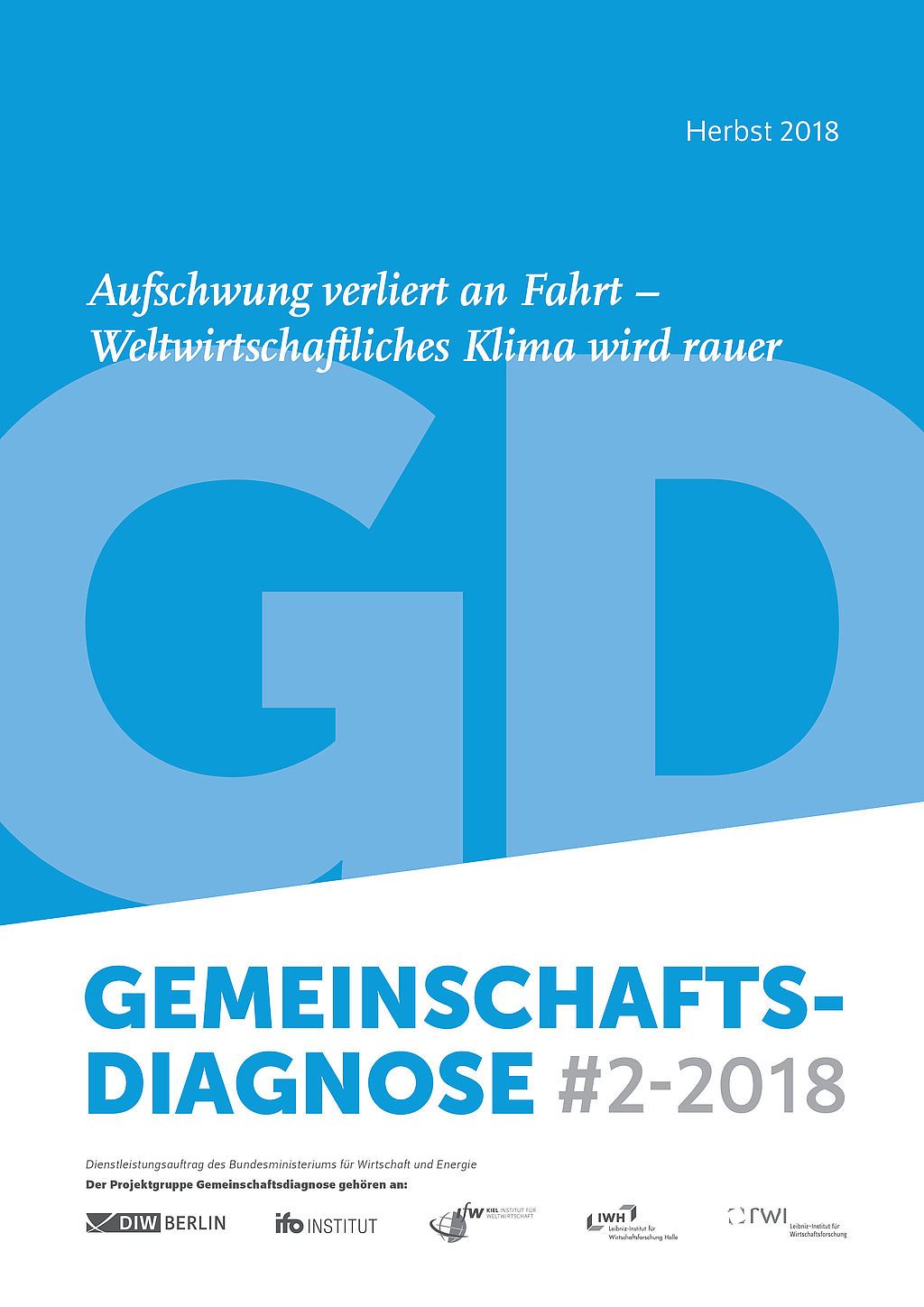Joint Economic Forecast Autumn 2018: Upturn Loses Momentum
“The upturn in the German economy is losing momentum. Demand from abroad has weakened, and companies are apparently suffering from labour shortages in production too,” explains Roland Döhrn, Head of Economic Forecasting at RWI – Leibniz Institute for Economic Research, which coordinated this autumn’s report. Commenting on the German government’s economic policy, he added: “Short-term initiatives like the family home-owner allowance tend to lead to windfall effects and rising costs because capacity utilisation in the construction industry is already high. In the current economic climate we need a housing policy that is geared more towards continuity.”

The number of persons in employment will rise from 44.9 million this year to 45.3 million next year and 45.6 million in 2020. At the same time, the number of registered unemployed persons will decline from 2.3 million this year to 2.2 million in 2019 and 2.1 million in 2020. This will bring the unemployment rate down from 5.2 percent this year to 4.8 percent in 2019 and 4.5 percent in 2020. Inflation in consumer prices will rise from an average of 1.8 percent this year to 2 percent in 2019, before dipping back down to 1.9 percent in 2020. Pressure from domestic prices will increase.
The institutes expect significant fiscal surpluses over the entire forecasting horizon. The surplus will hit a new record high of 54 billion euros this year. By 2020 the fiscal balance will melt down to 41 billion euros due to the government’s expansionary fiscal policy stance.
The risks for the German and international economic have grown since spring. At a global level this is mainly due to the rising number of trade conflicts, while the main risks at a European level are the possibility of Britain’s disorderly exit from the EU and the potential outbreak of a debt crisis in Italy.
The Joint Economic Forecast was prepared by RWI (Essen), DIW (Berlin), the ifo Institute (Munich), IfW (Kiel) and IWH (Halle).
Full-length version of the report
Joint Economic Forecast Project Group: Upturn Loses Momentum – World Economic Climate Grows Harsher, Autumn 2018. Essen 2018.
The full-length version of the report will be available at www.gemeinschaftsdiagnose.de/category/gutachten/
About the Joint Economic Forecast
The Joint Economic Forecast is published twice a year on behalf of the German Federal Ministry for Economic Affairs and Energy. The following institutes participated in the autumn report 2018:
- German Institute for Economic Research (DIW Berlin)
- ifo Institute - Leibniz Institute for Economic Research at the University of Munich in cooperation with the Swiss Institute for Business Cycle Research (KOF) at ETH Zurich
- Kiel Institute for the World Economy (IfW Kiel)
- Halle Institute for Economic Research (IWH) – Member of the Leibniz Association
- RWI – Leibniz Institute for Economic Research in cooperation with the Institute for Advanced Studies Vienna
Scientific Contacts
Dr. Claus Michelsen
German Institute for Economic Research (DIW Berlin)
Tel +49 30 89789 458
CMichelsen@diw.de
Professor Dr. Timo Wollmershäuser
ifo Institute – Leibniz Institute for Economic Research at the University of Munich
Tel +49 89 9224 1406
Wollmershaeuser@ifo.de
Professor Dr. Stefan Kooths
Kiel Institute for the World Economy (IfW Kiel)
Tel +49 341 8814 579 oder +49 30 2067 9664
Stefan.Kooths@ifw-kiel.de
Professor Dr. Oliver Holtemöller
Halle Institute for Economic Research (IWH) – Member of the Leibniz Association
Tel +49 345 7753 800
Oliver.Holtemoeller@iwh-halle.de
Professor Dr. Roland Döhrn
RWI – Leibniz Institute for Economic Research
Tel +49 201 8149 262
Roland.Doehrn@rwi-essen.de
Whom to contact
For Researchers

Vice President Department Head
If you have any further questions please contact me.
+49 345 7753-800 Request per E-MailFor Journalists

Head of Public Relations
If you have any further questions please contact me.
+49 345 7753-720 Request per E-MailIWH list of experts
The IWH list of experts provides an overview of IWH research topics and the researchers and scientists in these areas. The relevant experts for the topics listed there can be reached for questions as usual through the IWH Press Office.
Related Publications

Upturn Loses Momentum – World Economic Climate Grows Harsher: Joint Economic Forecast Autumn 2018
in: Externe Monographien, 2, 2018
Abstract
The economic upturn in Germany is entering its sixth year, but is losing momentum. This is due to both demand and supply side factors. On the one hand, Germany’s key sales markets have weakened in line with the slowdown in world trade. On the other hand, a growing number of companies are apparently facing production-side bottlenecks, especially in terms of labour and sourcing intermediate goods. This overlaps with problems in the automotive industry related to the introduction of the new World Harmonised Light Vehicle Test Procedure (WLTP), which has clearly impacted gross domestic product (GDP) growth due to the branch’s economic weight. Adjustment problems, however, should be overcome in the course of the winter half year. Stimuli from fiscal policy measures will also take effect as of the beginning of 2019. After 1.7% growth this year, economic output will increase at rates of 1.9% in 2019 and 1.8% in 2020. Employment will continue to expand clearly, although at a slower pace. The number of registered unemployed persons will approach the 2 million-mark by the end of the forecasting horizon. Inflation will pick up from an average rate of 1.8% this year to 2.0% in 2019 and 1.9% in 2020. Despite its expansionary fiscal stance, the German government will continue to post a budget surplus, although this can be expected to fall from 54 billion euros to around 40 billion euros.



